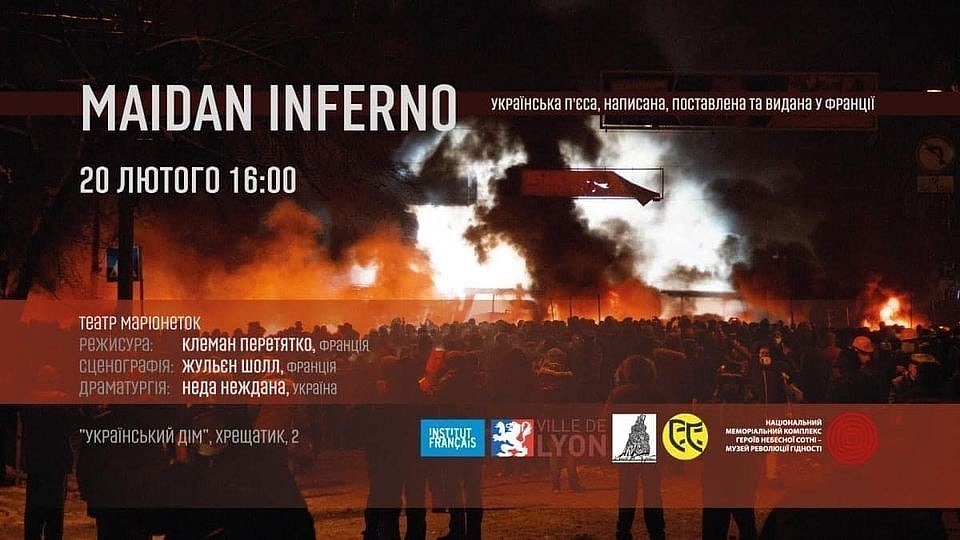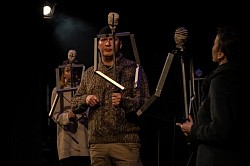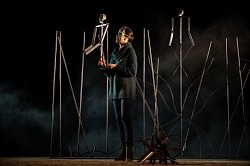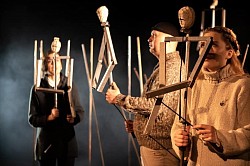Maidan Inferno - Neda Nejdana
Puppet theater show
- The show is in the permanent repertoire of the Dnipro Academic Drama and Comedy Theatre (Ukraine) -
Text : Neda Nejdana
Directed by : Clément Peretjatko
Scenography : Julien Scholl
Music : Andrew Karachun
Puppets : Clément Peretjatko, Vitaly Golub
Performance : Permanent team of the Dnipro Academic Drama and Comedy Theatre (4 people on stage)
Language : Ukrainian, with surtitles
Duration : 1h40
Synopsis:
"The Maidan is alive, as if it were the rhythm of my heart ," says young Ania while searching for Orestes in Kyiv's clandestine hospitals and treatment centers. With the slogan "freedom or death," she participated in the Revolution of Dignity, which brought together up to a million people from all over Ukraine in Independence Square in Kyiv in 2013-2014.
An interweaving of realities and forms of writing, relating to agit-prop theatre, intervention theatre, testimonial theatre, reportage and the mystery of the Middle Ages, Maidan Inferno follows the intertwined destinies of Ukrainian revolutionaries from the intervention of the paramilitary armed forces against them to the annexation of Crimea and the invasion of Ukraine by Russia.
Creation and tour:
* February 17, 2022: Dnipro Academic Drama and Comedy Theater (Ukraine).
* February 20, 2022: House of Ukrainians in Kyiv - Maidan Museum (Ukraine).
* August 24, 2022: Dnipro Academic Drama and Comedy Theater (Ukraine).
* October 1, 2022: Iasi International Theatre Festival (Romania). Romanian subtitles.
* February 22, 2023: Dnipro Academic Drama and Comedy Theater (Ukraine).
* July 22, 2023: International Theatre Festival in Prizren (Kosovo). English and Albanian subtitles.
* August 23, 2023: Dnipro Academic Drama and Comedy Theater (Ukraine).
They talk about the show:
Credits:
Co-production and hosting in residence: Dnipro Academic Drama and Comedy Theatre (Ukraine).
Supporters: Les Kourbas Center (Kyiv), Maidan Museum (Kyiv), City of Lyon as part of its agreement with the French Institute of Paris.
The French text is published by l'Espace d'un Instant, in a translation by Estelle Delavennat.
French creation:
In September 2019, a French version of the show was created at the IN of the World Festival of Puppet Theaters of Charleville-Mézières, co-producer of the show, with the support of the City of Lyon as part of its agreement with the French Institute of Paris, the French Institute / French Embassy in Ukraine, the Entrepont in Nice, RAMDAM in St-Foy-Les-Lyon, the Arketal workshop in Cannes and the Nouzonville theater.
The opening of the play published by l'Espace d'un Instant took place at the Théâtre du Point du Jour (Lyon) in 2016 as part of the artists invited to the Étranges Étrangers festival, in a staging by Clément Peretjatko.
Statement of intent:
The play is based on three levels of writing to which the staging and the use of puppets respond:
* The interludes are dialogue passages between seven characters (Orestes the mountaineer, Ania the literature student, Stepanych the security guard, Zoia the nurse, Paphnutius the seminarian, Lyub the musician, and Margot the journalist). These interludes are set in the chronology of the revolution and take place on Maidan Square. Each character is played by a puppet, which is manipulated in full view by the actors.
* The timeless monologues focus on Ania and Orestes. Two of the actors embody the words and double the characters. In contrast to the interludes, the thoughts have more time to unfold.
* Social media, represented in the form of a chorus of actors, reflects the organization of the Maidan on the internet (Twitter, Instagram, Facebook, Skype, etc.). They are managed by the actors, individually or in chorus.
Maidan Inferno is the story of Ania, who can be considered the central character. A young literature student, she experiences her first flirtation with Orestes in the square. But in the very first scene, a prologue that mixes romantic discussion and a troubled look at the Euromaidan, the two young people are separated by a surprise and violent intervention by the Berkuts. Ania escapes wounded and bruised, but like a myth of Orpheus in reverse, she sets out to find Orestes in the hospitals and clandestine treatment centers of Kyiv. Despite the danger and the insistence of other Euromaidanists that she return home, she cannot bring herself to leave the revolution: "The Maidan is alive, as if it were the rhythm of my heart," she declares, without anyone being able to guess whether she is still alive. "I don't want them to kill me, to kill my loved ones." But will it save me? Will it take my freedom? Or my life? I don't know, I just want to get rid of fear." Ania's commitment, as she goes through the hell of the Maidan, is a lesson in courage that leads to the play's final line, a slogan borrowed from the French Revolution for which today's Ukraine has so much affection: "Freedom or death!"
It is through a series of monologues, the true backbone of the play, that the thoughts of Ania and Orestes intersect. If these monologues initially reflect the trauma of the violence: "I couldn't not go back and get her. When big, heavily armed thugs beat a young girl so violently, it sends shivers down your spine!" , they then give way to the doubts and certainties of the two young people regarding the Euromaidan:
Orestes: "I am at home, among my own people. Maidan is the new Sitch, the Automaidan its cavalry, and the buildings its fortresses. Every week a council is held, where there are no permanent leaders, and we have no need of them, for we do not believe in the supertsar: we are free-spirited Cossacks."
Ania: "I read history and cried: how many were arrested, tortured, and murdered so that this land could remain Ukrainian? One hundred and thirty-four bans on our language in four centuries! If you choose Russian, does that mean that these sacrifices were in vain, and that the invaders won?"
Orestes: "(…) fighting against others is easier than working on oneself. And now it's war: in minds, in souls, on screens and in the streets. A lethal war. It begins in the brain with words as weapons."
Social media is part of a virtual reality. It is a space widely used by Euromaidanists. Thus, the Automaidan brings together motorists who coordinate on Skype to block Kyiv's arteries, evacuate the wounded, transport VIPs, etc. Advice on how to behave in the event of arrest is provided on social media, similarly, individuals follow the city's webcams to warn of paramilitary movements (this monitoring work is sometimes done from outside Ukraine, day and night). Social media is also a space for debate: among several questions about Ukraine's European future, we find a quote from the Polish writer, poet, and journalist Andrzej Stasiuk: "It (Europe) refuses to realize that the values it recognizes are accepted beyond its nominal limits." She trembles at the thought that this could be so, because it only means trouble for her. She shrinks, curls up, hides behind a curtain. She madly calculates profits and losses. She dies of fear for her products. For her disgusting tranquility, her obscene prosperity, her abominable complacency. The Ukrainian winter of 2014 is a European catastrophe.
The interludes are unusual in that they were written later by the author Neda Nejdana. They feature the play's seven characters. These are times of more conventional exchanges between revolutionaries on the Maidan. The lines are short, the thoughts are more hesitant, and the discussions focus on the storming of City Hall, the dismantling of Lenin's statue, techniques for confronting the armed forces, the cultural events of the Maidan, and so on. The discussions are interspersed with jokes from the musician Lyubomyr, with warnings and paternalistic advice from the security guard Stepanytch towards Ania, with the interventions of the journalist Margot who will come to join the demonstrators for lack of being able to cover the events objectively, with the swearing of the nurse Zoïa who is fuming at not being able to decently take care of the wounded and who is afraid for her young policeman brother who is acting as cannon fodder to protect the overtrained Berkuts, with the predictions of a priest who is still a seminarian and who constantly calls for prayer in the middle of the clashes.
For if religion, which was banned by the USSR, is today very present in Ukraine, it is into the heart of hell that Maidan Inferno plunges us. A hell from which, after having experienced it, no one escapes. When Ania finally finds Orestes in a white space similar to purgatory, the tender and naive purity of youth has disappeared:
Ania - Hi, Orestes. Welcome home. Do you remember?
Orestes - Of course, Angelina... My first angel...
Ania - I'm not really an angel anymore...
Orestes - And that's very good. It means you're alive...
Before dying from a sniper shot, the guard Stepanych will have time to confess to not having protected his son who died in pre-trial detention: "Officially, he died of pneumonia, but his body was covered in bruises, maybe they had beaten him to death, who knows... Holding a trial? It wouldn't have brought my son back..." "God is merciful, but the sin is greater for those who slandered and poisoned your child," his confessor replies.
Orestes sums up this hell into which Ukraine is plunging: "I still remember Dante's words: 'The hottest places in hell are destined for those who, in times of grave crisis, have remained neutral.' Hell... Here, however, it is fire that saves us. Everything inverted, it is the world upside down. But it is from cold and solitude that we suffer."
Maidan Inferno is thus comparable to the mystery of the Middle Ages where hell was represented on one side and paradise on the other in the central square of the village, the spectator being free to pass from one to the other. The interludes refer to the structure of the representations of the nativity that were performed at that time throughout Europe, first in the churches and then on the square in front of the church when the pagan scenes (the interludes) became too insistent and the morality of the representation was weakened. It was also the Ukrainian priests who, to educate about the nativity, gave birth to the traditional puppet theater in Ukraine, the Vertep, in 1654. It is characterized by its itinerant form and by a portable two-story booth where the divine and earthly worlds coexist. Forms of Vertep were also played out on the Maidan, and through the use of allegory, the crowd saw Putin through Herod, and Ukrainian youth through the murdered children.
The puppets in the show are loosely inspired by Vertep, which ceased to exist in its original form after the 1917 revolution, fought by the communists in favor of education and propaganda, which socialist realism carried from 1932. The puppets in Maidan Inferno do not seek to represent and characterize each character in a figurative way, but to leave an opening to allow everyone to identify with the spiritual and aesthetic values of the Maidan. Their development is done in observation and in response to the aesthetics that emerged on Maidan Square as well as to post-Maidan aesthetics. Constructed of paper, the puppets are light and carry within them a fragility. The challenge of this sculptural work is to find a balance between naturalism and abstraction to allow the spectator's imagination to complete the characters while experiencing the historical experience of the Maidan.
The scenography is composed of rebar modules. These elements are sleeved and rearranged by the actors throughout the show. They become a networking system, barricades, a fire, batons, "puppet bases," etc. Due to their heaviness, they create tension with the fragility and lightness of the paper puppets. Some of these elements are curved, which adds relief to the structure while echoing the violently exposed street furniture.
The Maidan experience offered to the spectator is amplified by the musical and sonic atmosphere of the performance. Moreover, the sound produced by the rebar bars is similar to the sound of the shields that the Euromaidanists clashed to give each other courage. The aim is to organicize the Maidan and echo Ania's heartbeat as she identifies with and becomes part of the revolution.
Are Ania and Orestes paying for their commitment with their lives? This is the question left open by the production. For while in the original text, they return from hell in the first epilogue to learn in the square that the president is on the run, the second epilogue plunges them right back into it: "Russia has sent troops to Crimea, and the Duma has passed a law authorizing the invasion of Ukraine..." announces the musician Lioubomyr. This production reminds us that achieving freedom is a Sisyphean task, but that, to quote Michel Corvin in the preface to Maidan Inferno: "Sisyphus remains hopeful."
This show seeks to question and develop the spectator's critical spirit by offering them an aesthetic and historical experience of the Maidan.
Clement Peretjatko
Maidan or the revolution of dignity:
Independence Square (Ukrainian: Майдан Незалежності, Maidan Nezalezhnosti) is the central square of Kyiv. It was named in 1991 after the fall of the Soviet Union and Ukraine's independence. The square has had several names, but is now commonly referred to as Maidan (from the Arabic-Persian: "the Square") or, improperly, Maidan Square.
Due to its central location, it has regularly been the center of popular cultural and political activities since the Soviet era. In 2004, during the Orange Revolution, thousands of demonstrators pitched tents there for several weeks in protest against presidential election fraud: an additional round was organized by the Supreme Court and opposition leader Viktoz Yushchenko came to power. In November 2011, demonstrations organized on the Maidan for the 7th anniversary of the Orange Revolution were banned by the authorities.
Led by young people, demonstrations resumed on the Maidan after Ukrainian President Yanukovych's rejection of an association agreement with the European Union on November 29, 2013. Initially cultural and peaceful, the occupation of the square quickly turned violent and repression, sparking a surge of intergenerational solidarity. This revolution, known as Euromaidan or the Revolution of Dignity, brought together up to a million people from across Ukraine. Street battles broke out between protesters and security forces orchestrated by the Berkuts (a paramilitary force serving the president), including snipers and live ammunition, as well as barricades and homemade catapults. This bloody repression resulted in hundreds of injuries and dozens of deaths, with the power shift in Kyiv on the night of February 21-22 following the flight of President Yanukovych. The revolution indirectly resulted in a fall of the far right (less than 2% in the May 2014 elections), which had been artificially hyped in previous years by the deposed president in an attempt to create a political opponent he could control. Russia, which had just lost its influence with Yanukovych, reacted quickly by annexing Crimea and launching a hybrid war against Ukraine in Donbass.
Yanukovych, who has been missing since fleeing Ukraine, was sentenced to thirteen years in prison for "high treason" on January 24, 2019, in absentia by a court in Kyiv. On February 7, 2019, two months before the presidential elections, Parliament adopted by 334 votes out of 385 deputies present the inclusion in the Ukrainian Constitution of the country's irreversible aspiration to join the European Union and NATO. In his speech to Parliament, President Poroshenko made a point of "reminding everyone that Russia's aggression was unleashed in February 2014, when Ukraine had the status of a non-aligned country. And that did not help save us."
The show Maidan Inferno follows the intersecting paths of several Euromaidanists from the start of the violence against them to the beginning of the Crimean crisis.




